Polycystic Ovary Syndrome (PCOS) is more than a hormonal condition; it’s a complex metabolic disorder that affects millions of women worldwide, often leading to challenges with weight management. If you’re a health-conscious individual navigating the murky waters of PCOS, you’re likely well aware that shedding pounds can feel like an uphill battle. Well, you’re in the right place! In this comprehensive guide, we’ll explore a PCOS diet plan for weight loss that’s grounded in science, practical experience, and expert insights. I’ll walk you through key principles of managing PCOS through nutrition, highlight foods that actually support your hormonal balance, and introduce lifestyle strategies to help you keep the weight off for good.
From understanding how insulin resistance and hormonal imbalances influence weight gain to choosing the best foods like Bob’s Red Mill Organic Chia Seeds and Wild Planet Wild Sardines in Extra Virgin Olive Oil, this article covers authentic, actionable tips designed specifically for folks with PCOS. Plus, you’ll get sample meal plans, supplement suggestions, and guidance on lifestyle tweaks to optimize your results. So, let’s dive in and take charge of your health with this tailored PCOS diet plan for weight loss!
Understanding PCOS and Its Impact on Weight Management
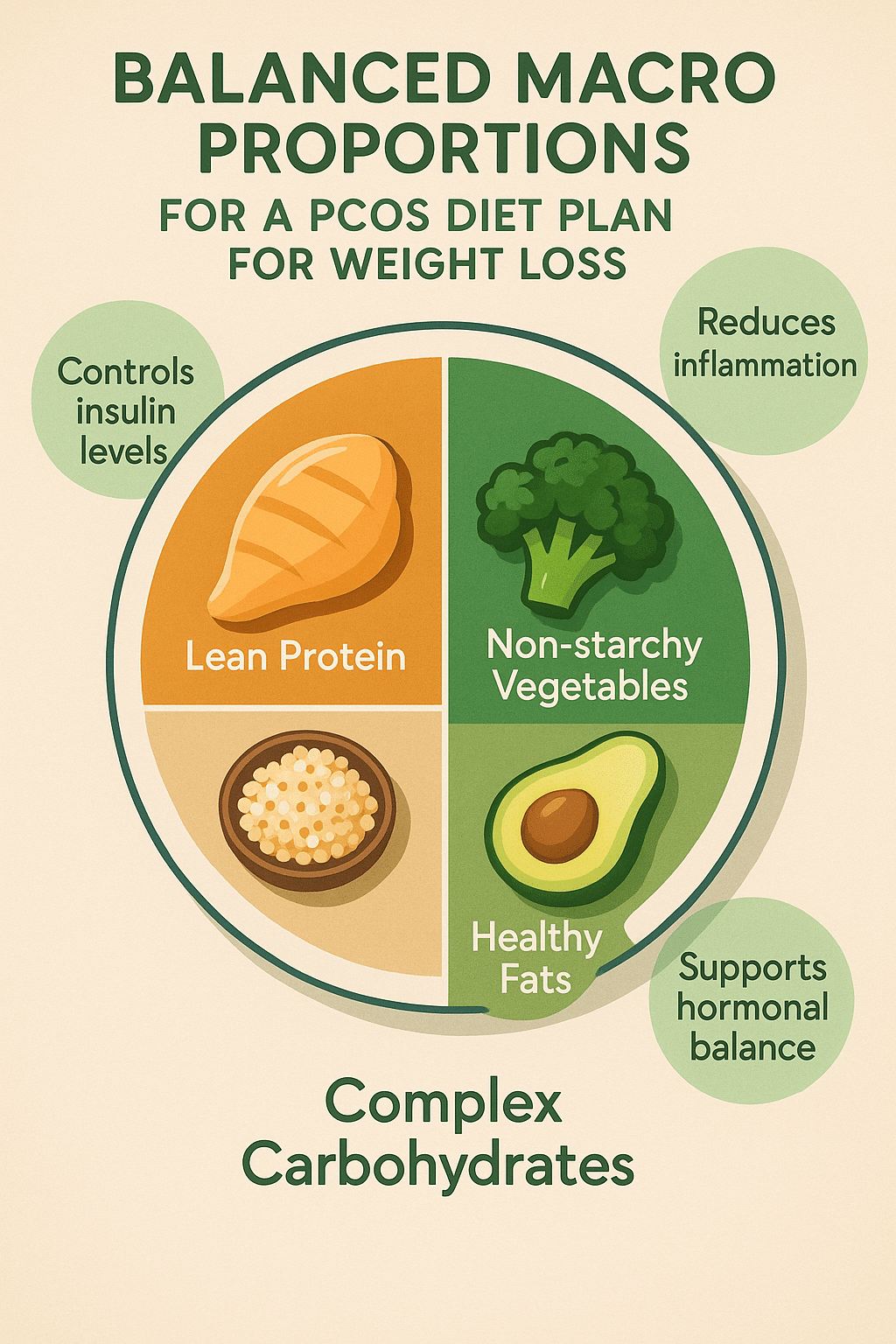
Before diving into the dietary specifics, it’s essential to understand what PCOS is and why it complicates weight loss. PCOS is a hormonal disorder that involves irregular menstrual cycles, excess androgen levels, and the presence of polycystic ovaries. But beyond these symptoms, PCOS disrupts the delicate hormonal balance critical for metabolic regulation and fat storage.
The Role of Insulin Resistance in PCOS Weight Gain
Insulin resistance is a core player in PCOS-related weight issues. Simply put, insulin is a hormone that helps your body use glucose from the food you eat for energy. In insulin resistance, your cells don’t respond properly to insulin, causing your pancreas to produce more insulin to compensate. This overload can promote fat storage, especially around the belly—a common problem area for women with PCOS.
Research shows that up to 70% of women with PCOS have insulin resistance regardless of body weight. This condition not only makes losing weight harder but also increases the risk of developing type 2 diabetes and heart disease. Therefore, a PCOS diet plan for weight loss often emphasizes blood sugar regulation and insulin sensitivity.
How Hormonal Imbalances Influence Metabolism and Fat Storage
PCOS disrupts the balance of reproductive hormones—primarily, it elevates androgens (male hormones like testosterone) and can reduce estrogen and progesterone levels. These imbalances change your metabolism, affecting how your body stores fat and builds muscle. For example:
- Higher androgens can increase abdominal fat.
- Decreased progesterone may slow metabolism.
- Insulin resistance worsens androgen production, creating a vicious cycle.
Understanding this hormonal interplay highlights why a standard calorie-counting diet may not be the best fix. Instead, a strategic diet—one that supports hormonal balance while improving insulin sensitivity—is crucial for lasting weight loss.
Core Principles of a PCOS Diet Plan for Weight Loss
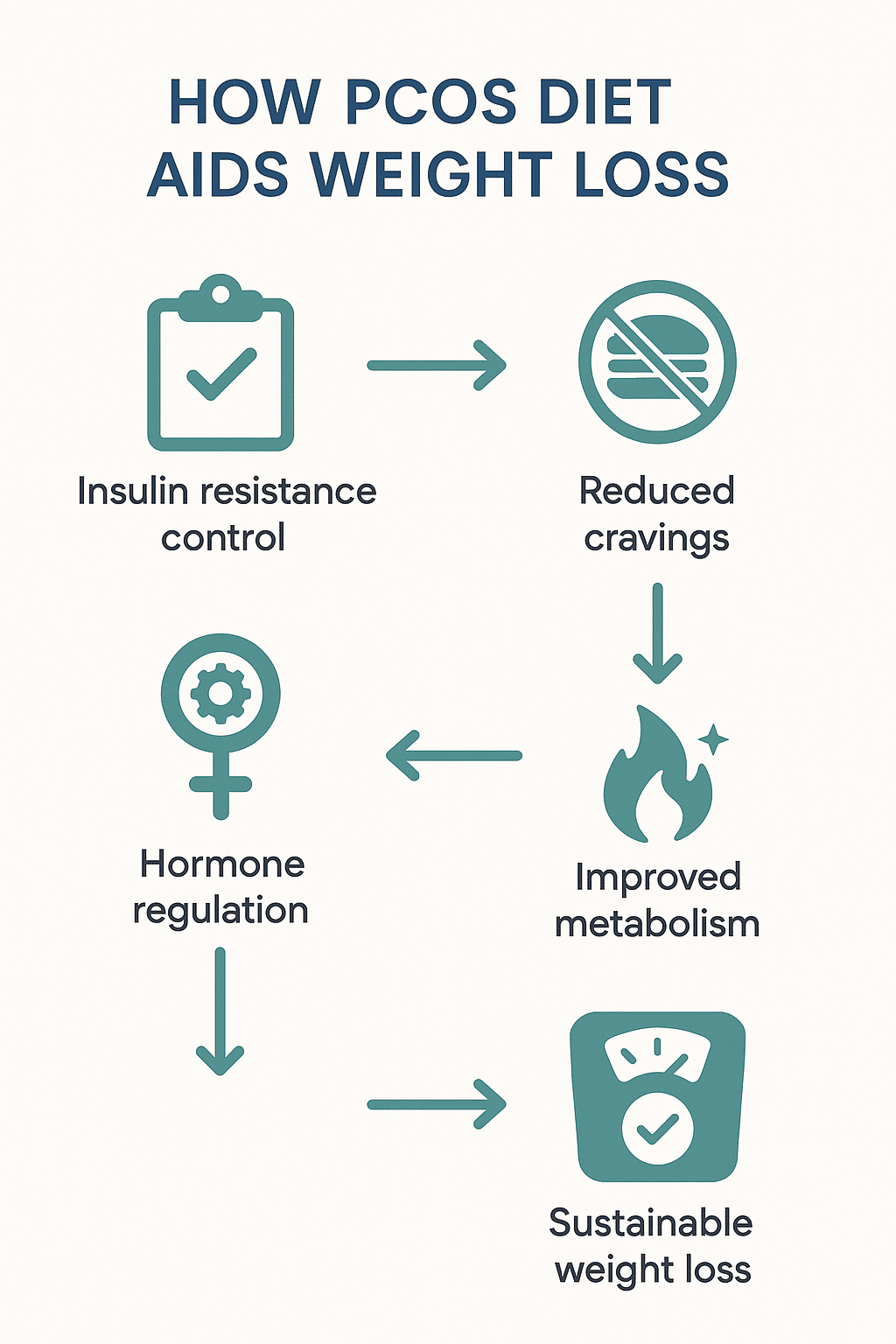
Crafting an effective PCOS diet plan for weight loss means focusing on nutrient quality, blood sugar control, and hormonal harmony. Here’s what that involves.
Balancing Macronutrients: Protein, Healthy Fats, and Complex Carbs
Balancing your intake of macronutrients is pivotal—it means getting the right amount of protein, fats, and carbs that support insulin regulation and satiety.
Benefits of a High Protein Diet for PCOS and Weight Loss
Protein slows digestion and the release of sugar into your bloodstream, which minimizes insulin spikes. It also helps preserve lean muscle mass, which is vital for boosting metabolic rate.
Good sources include:
- Lean meats like chicken and turkey
- Fish such as the Wild Planet Wild Sardines in Extra Virgin Olive Oil, packed with omega-3s and protein
- Plant-based proteins like legumes and quinoa
Eating around 25-30% of your daily calories from protein is an evidence-backed strategy for managing PCOS and supporting weight loss.
Incorporating Healthy Fats: Omega-3s and Monounsaturated Fats
Healthy fats improve insulin sensitivity and reduce inflammation, both key concerns for PCOS management. Omega-3 fatty acids, found in fatty fish like sardines or in seeds, help balance hormones and combat chronic inflammation.
Include:
- Fatty fish (Wild Planet Sardines are an excellent choice)
- Seeds such as Bob’s Red Mill Organic Chia Seeds and flaxseeds
- Nuts like walnuts and almonds
- Avocado and olive oil
Choosing Low Glycemic Index Carbohydrates to Regulate Blood Sugar
Carbs need not be off-limits, but choosing low glycemic index (GI) and fiber-rich carbs is essential to keep insulin stable. These carbs digest slowly, preventing sugar surges.
Focus on:
- Whole grains such as oats, barley, and the Nature’s Path Organic Flaxseed Cereal
- Non-starchy vegetables like leafy greens and cruciferous veggies
- Legumes such as lentils and chickpeas
Emphasizing Fiber-Rich Foods for Satiety and Gut Health
Fiber richly benefits PCOS by promoting satiety, which controls appetite and supports weight loss. Plus, it aids gut microbiome diversity, which recent studies suggest affects hormonal regulation.
Aim for soluble and insoluble fiber sources like chia seeds, flaxseed cereal, vegetables, and beans. For example, sprinkling Bob’s Red Mill Organic Chia Seeds on your morning yogurt or smoothie adds valuable fiber and omega-3s to your diet.
Top PCOS-Friendly Foods to Include in Your Diet
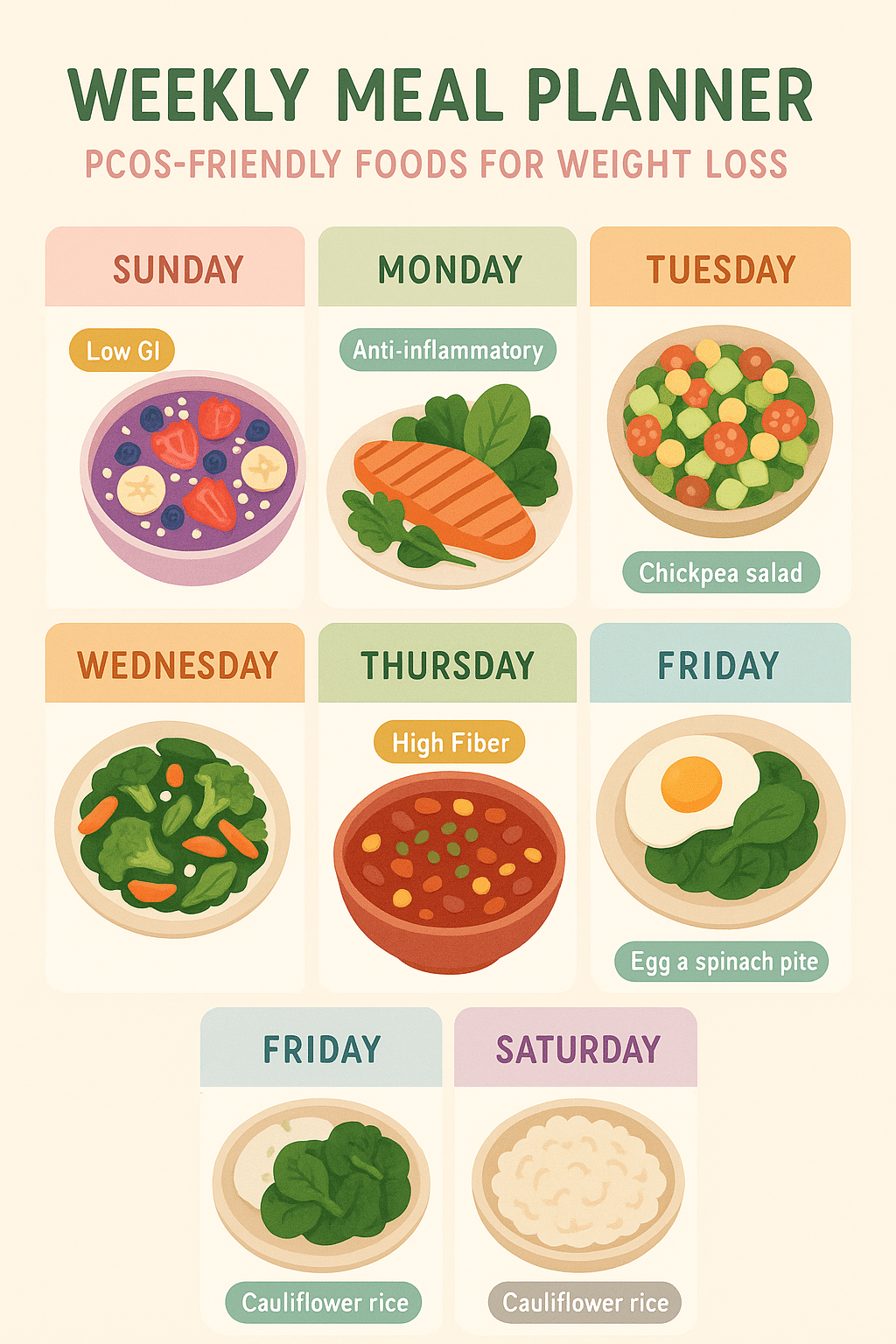
Choosing the right foods can make all the difference in managing PCOS symptoms and achieving weight loss.
Lean Protein Sources: Chicken, Fish, and Plant-Based Alternatives
Incorporate palm-to-plate lean products:
- Skinless chicken breast
- Wild-caught fish—your go-to is Wild Planet Wild Sardines in Extra Virgin Olive Oil, which provide anti-inflammatory effects through omega-3s and are convenient for meal prepping.
- Plant-powered options: tofu, tempeh, and legumes for their nutrient density and fiber.
Anti-Inflammatory Foods and Their Role in Hormonal Balance
Inflammation perpetuates hormonal imbalances and insulin resistance in PCOS. Eating anti-inflammatory foods can soothe these effects.
Stock your diet with:
- Berries
- Leafy greens like kale and spinach
- Chia and flax seeds (Bob’s Red Mill and Nature’s Path products are perfect staples)
- Turmeric and ginger used in cooking
Superfoods for PCOS: Leafy Greens, Berries, and Cruciferous Vegetables
Supercharge your meals with:
- Kale, spinach, and Swiss chard, which offer micronutrients like magnesium and vitamin D linked to improved insulin sensitivity.
- Berries, rich in antioxidants.
- Cruciferous veggies (broccoli, cauliflower) shown to aid estrogen metabolism, balancing hormones.
Fermented Foods to Support Gut Microbiome Health
Gut health influences hormone regulation and inflammation. Fermented foods like yogurt, kimchi, and sauerkraut add beneficial bacteria.
To compliment, add fiber-rich cereals like Nature’s Path Organic Flaxseed Cereal at breakfast to foster gut bacteria diversity.
Foods to Avoid: Minimizing Inflammation and Insulin Spikes
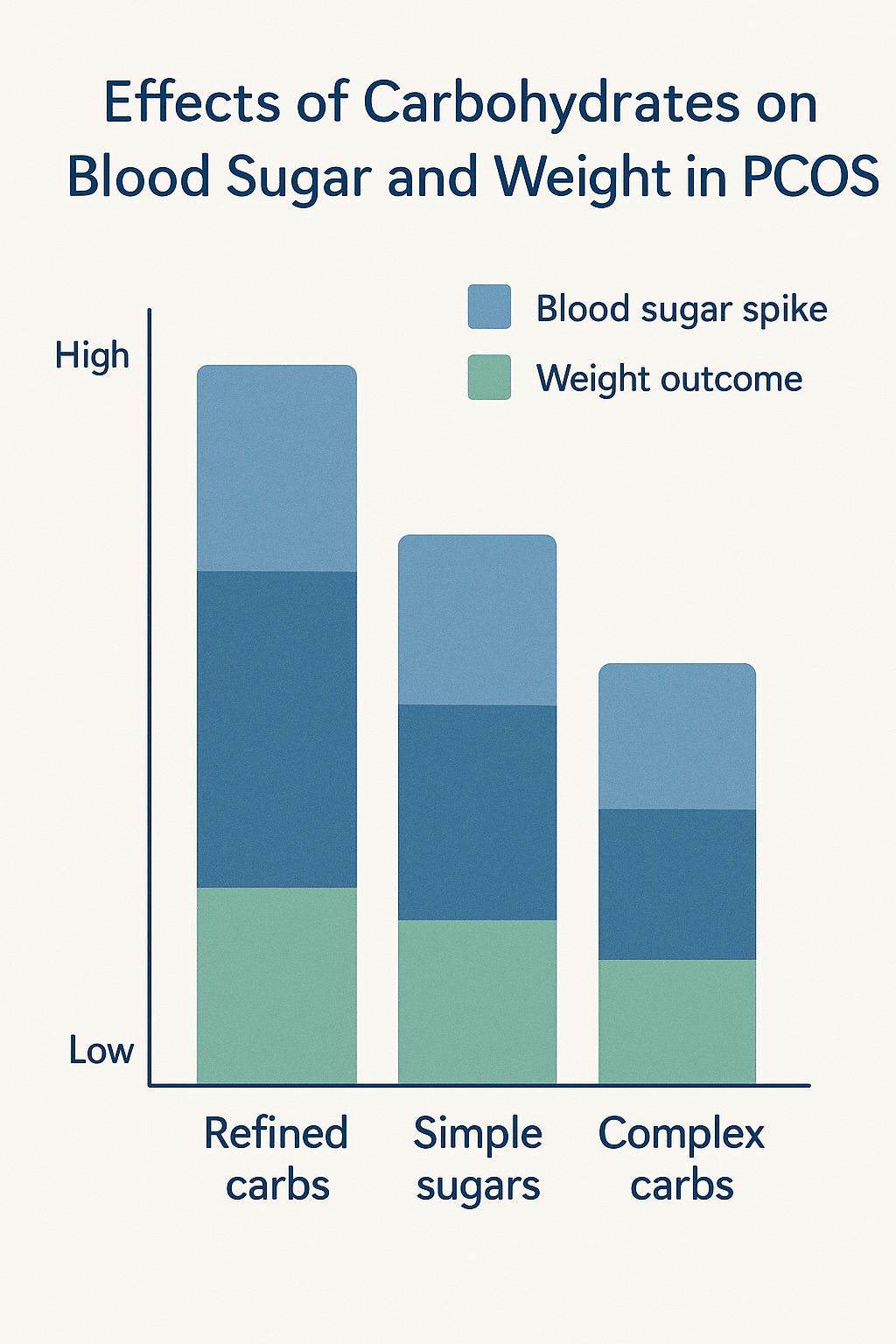
Understanding what to limit is as key as knowing what to eat.
Refined Carbohydrates and Sugary Foods
These include:
- White bread, pastries, and sugary cereals
- Soda and sugary drinks
- Excessive sweets
They cause rapid glucose spikes, worsening insulin resistance and inflammation.
Processed and Fried Foods, Hydrogenated Fats, and Excess Sodium
Avoid trans fats found in processed and fried foods that raise inflammation. Excessive sodium may exacerbate water retention and blood pressure issues.
Potentially Hormone-Disrupting Foods to Limit
Certain additives and pesticides in conventionally farmed foods may disrupt hormones. Opt for organic where possible, and reduce intake of soy supplements or processed soy products.
Meal Timing, Portion Control, and Frequency for Insulin Regulation
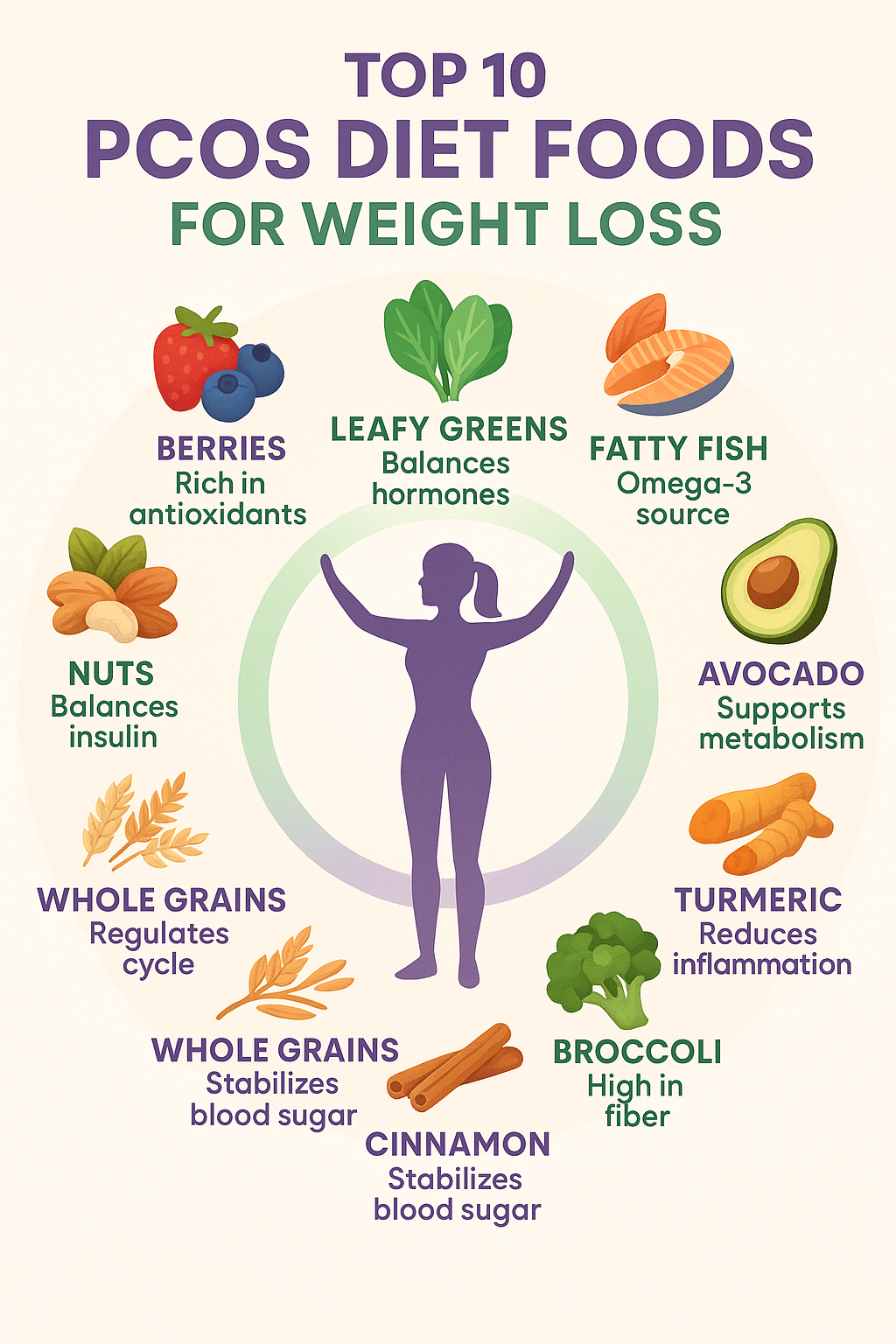
Benefits of Spaced Meals and Avoiding Undereating
Eating smaller, balanced meals every 3-4 hours keeps blood sugar steady and prevents overeating later. Skipping meals or undereating can backfire, increasing hunger and reducing metabolic rate.
Smart Carb Swaps and Portion Tips for Effective Weight Loss
Swap white rice for quinoa or barley, sugary snacks for nuts, and limit plate portions with half vegetables, a quarter lean protein, and a quarter complex carbs.
Lifestyle Strategies Complementing Your PCOS Diet Plan
Stress Management and Cortisol Control for Weight Maintenance
Chronic stress raises cortisol, promoting fat accumulation and insulin resistance. Mindfulness, yoga, and breathing exercises can help regulate stress hormone levels.
Importance of Adequate Sleep in Metabolic Health
Poor sleep disrupts hunger hormones and insulin sensitivity. Aim for 7-9 hours nightly to support weight loss efforts.
Exercise Recommendations: Resistance Training and Cardio for PCOS
Combining resistance training with aerobic exercise enhances insulin sensitivity and promotes fat loss. Aim for 3-5 days weekly, blending weightlifting, bodyweight exercises, and moderate cardio.
Supplement Support for a PCOS Diet Plan
Incorporating Vital Proteins Collagen Peptides Powder for Overall Wellness
Vital Proteins Collagen Peptides Powder supports skin, joints, and may aid in muscle maintenance, complementing your protein intake. It blends effortlessly into coffee or smoothies without altering taste.
Benefits of Wild Planet Wild Sardines in Extra Virgin Olive Oil and Organic Valley Omega-3 Whole Milk
Wild Planet Sardines provide bioavailable omega-3s and vitamin D—both crucial for reducing inflammation and improving insulin sensitivity. Paired with Organic Valley Omega-3 Whole Milk, a good source of protein, calcium, and omega-3s, these can round out your nourishing PCOS diet plan.
Sample 7-Day PCOS Diet Plan for Weight Loss
Balanced Meal Examples Featuring Recommended Foods and Products
| Day | Breakfast | Lunch | Dinner | Snacks |
|---|---|---|---|---|
| Day 1 | Greek yogurt with Bob’s Red Mill Organic Chia Seeds and berries | Grilled chicken salad with olive oil dressing | Baked Wild Planet Sardines with roasted broccoli and quinoa | A handful of almonds |
| Day 2 | Oatmeal with Nature’s Path Organic Flaxseed Cereal and cinnamon | Lentil soup with kale and carrots | Stir-fried tofu with mixed vegetables and brown rice | Carrot sticks and hummus |
| Day 3 | Smoothie with spinach, Vital Proteins Collagen Peptides, and banana | Turkey breast wrap with avocado and salad | Grilled salmon, sweet potato, and steamed asparagus | Apple slices with peanut butter |
| Day 4 | Whole grain toast with avocado and boiled eggs | Quinoa salad with chickpeas, kale, and lemon dressing | Zucchini noodles with pesto and grilled chicken | Mixed berries |
| Day 5 | Cottage cheese with Bob’s Red Mill Organic Chia Seeds and cinnamon | Wild Planet Sardines salad with cucumbers and tomatoes | Beef stir-fry with bell peppers and brown rice | A small portion of walnuts |
| Day 6 | Smoothie bowl topped with Nature’s Path Organic Flaxseed Cereal and sliced almonds | Baked tofu, spinach, and quinoa salad | Grilled chicken breast with roasted Brussels sprouts | Greek yogurt with honey |
| Day 7 | Omelette with spinach, tomatoes, and feta cheese | Lentil and vegetable stew | Baked cod with sautéed green beans and cauliflower rice | Celery sticks with almond butter |
Snack Options and Hydration Tips
- Snack on raw nuts, low-sugar fruit, and veggie sticks with protein dips.
- Drink plenty of water throughout the day.
- Herbal teas like peppermint or cinnamon can soothe digestion and help with insulin regulation.
Tracking Progress and Adapting Your Diet Plan for Long-Term Success
Monitoring Hormonal and Metabolic Markers
Regular check-ins with your healthcare provider to test insulin levels, androgen levels, and glucose tolerance can guide dietary adjustments.
Personalizing Diet Plans to Suit Individual Needs and Preferences
Your diet should reflect your lifestyle, preferences, and medical recommendations. Flexibility ensures you maintain the PCOS diet plan for weight loss sustainably.
FAQs
1. What is the best PCOS diet plan for weight loss?
The best plan balances lean proteins, healthy fats (like omega-3s), and low glycemic complex carbs alongside fiber-rich foods to manage insulin resistance and inflammation.
2. Can I lose weight with PCOS naturally through diet alone?
Yes, by focusing on blood sugar regulation, nutrient-dense foods, portion control, and lifestyle changes, natural weight loss is achievable, though combining diet with exercise and stress management optimizes results.
3. Why is fiber important in a PCOS diet plan for weight loss?
Fiber promotes satiety, reduces blood sugar spikes, and supports gut health, all of which aid in controlling PCOS symptoms and facilitating weight loss.
4. Are supplements like collagen peptides helpful for PCOS?
Collagen can support skin, joint, and muscle health, which may enhance overall wellness during weight management, but it’s best combined with a balanced diet and approved by your healthcare provider.
5. How do I control insulin spikes through meal timing in PCOS?
Eating balanced meals spaced every 3-4 hours prevents large blood sugar fluctuations. Avoid skipping meals and include protein, fiber, and healthy fats at each meal.
Quick Takeaways/Key Points
- PCOS weight gain is primarily linked to insulin resistance and hormonal imbalances.
- Balancing protein, healthy fats, and low GI carbs regulates blood sugar and supports weight loss.
- Incorporate anti-inflammatory and fiber-rich foods like Bob’s Red Mill Organic Chia Seeds and Nature’s Path Organic Flaxseed Cereal.
- Avoid refined sugars, processed foods, and hormone-disrupting ingredients to reduce inflammation.
- Lifestyle factors such as stress management, sleep, and exercise are critical allies in your weight loss journey.
Conclusion
Embracing a PCOS diet plan for weight loss isn’t about deprivation or rigid eating schedules; it’s about nourishing your body intelligently to promote hormonal balance, reduce insulin resistance, and ease inflammation. By thoughtfully incorporating nutrient-dense foods—like Wild Planet Wild Sardines, Bob’s Red Mill Organic Chia Seeds, Nature’s Path Organic Flaxseed Cereal, Vital Proteins Collagen Peptides, and Organic Valley Omega-3 Whole Milk—you’re not just trying another diet; you’re empowering your health.
Remember, this journey requires patience and consistency. Track your progress, personalize your plan, manage your stress, and move your body regularly. Soon enough, you’ll see lasting changes—not just on the scale but in your overall well-being.
Take the first step today—explore these tips, try the sample meal plan, and consult with your healthcare provider to tailor this knowledge to your unique needs. Your path to managing PCOS and shedding weight sustainably starts now!

